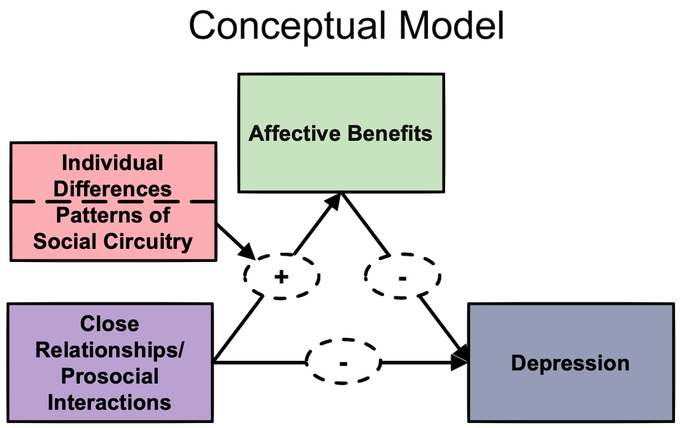Our Research
|
The central theme of our lab is how close relationships and interpersonal functioning confer protection or risk in the development and clinical course of depression. Although interpersonal relationships are considered both a protective and risk factor for psychopathology, including depression, the mechanisms are not yet sufficiently understood. To better understand these mechanisms, my work has focused on the following three interrelated lines of clinical and basic research using experimental and naturalistic methods (e.g., fMRI, ecological momentary assessment): (1) the role of interpersonal factors in depression; (2) the cognitive-affective benefits of the social regulation of emotion; and (3) the roles of social and reward neural circuitries in rewarding and supportive social experiences. Further, I have primarily focused on examining these three lines of research in adolescence and young adulthood, as they are periods involving high depression risk, high sensitivity to social stimuli, and continued social and affective development.
|
Publications
Flores, Jr., L.E., Eckstrand, K.L., Silk, J.S., Allen, N.B., Ambrosia, M., Healey, K.L., & Forbes, E.E. (in press). Adolescents’ neural response to social reward and real-world emotional closeness and positive affect. Cognitive, Affective, & Behavioral Neuroscience.
Flores, Jr., L.E., Cyranowski, J.M., Amole, M., & Swartz, H.A. (2017). Prospective assessment of social network quality among depressed mothers treated with brief psychotherapy: Validation of the Social Network Quality (SNQ) scales. Comprehensive Psychiatry, 78, 98-106.
Flores, Jr., L. E., & Berenbaum, H. (2017). The social regulation of emotion and updating negative contents of working memory. Emotion, 17(4), 577-588.
Flores, Jr., L.E., & Berenbaum, H. (2017). The effect of the social regulation of emotion on emotional long-term memory. Emotion, 17(3), 547-556.
Flores, Jr., L.E., & Berenbaum, H. (2014). Desired emotional closeness moderates the prospective relations between levels of perceived emotional closeness and psychological distress. Journal of Social and Clinical Psychology, 33(8), 673-700.
Flores, Jr., L. E., & Berenbaum, H. (2012). Desire for emotional closeness moderates the effectiveness of the social regulation of emotion. Personality and Individual Differences, 53(8), 952-957.
Flores, Jr., L.E., Cyranowski, J.M., Amole, M., & Swartz, H.A. (2017). Prospective assessment of social network quality among depressed mothers treated with brief psychotherapy: Validation of the Social Network Quality (SNQ) scales. Comprehensive Psychiatry, 78, 98-106.
Flores, Jr., L. E., & Berenbaum, H. (2017). The social regulation of emotion and updating negative contents of working memory. Emotion, 17(4), 577-588.
Flores, Jr., L.E., & Berenbaum, H. (2017). The effect of the social regulation of emotion on emotional long-term memory. Emotion, 17(3), 547-556.
Flores, Jr., L.E., & Berenbaum, H. (2014). Desired emotional closeness moderates the prospective relations between levels of perceived emotional closeness and psychological distress. Journal of Social and Clinical Psychology, 33(8), 673-700.
Flores, Jr., L. E., & Berenbaum, H. (2012). Desire for emotional closeness moderates the effectiveness of the social regulation of emotion. Personality and Individual Differences, 53(8), 952-957.
|
Luis E. Flores Jr.
Assistant Professor Queens University, Kingston B.A. University of California, Berkeley, 2007 Ph.D., University of Illinois, Urbana-Champaign, 2015 (Full CV) T: 613-533-3177 E: [email protected] |







